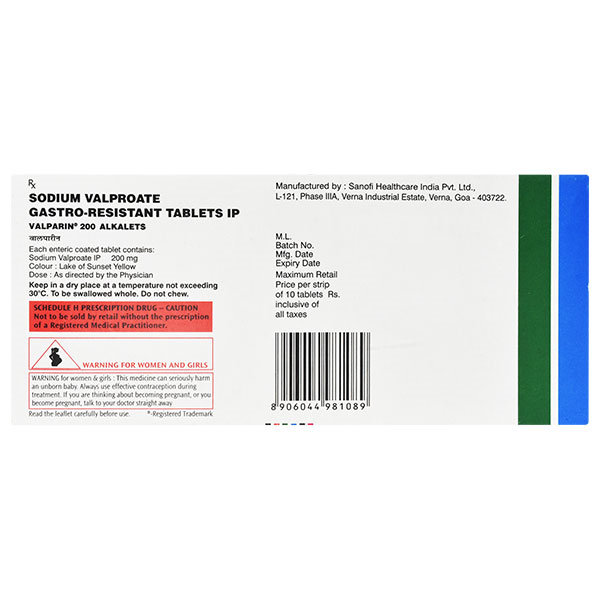Valparin 200 Mg
$31.00 – $48.00
Valparin 200 mg contains Sodium Valproate, an antiepileptic and mood-stabilizing medication used to treat seizures, bipolar disorder, and to prevent migraine headaches.
- Prevents seizures by regulating electrical activity in the brain.
- Stabilizes mood in patients with bipolar disorder, helping to control mood swings.
- Reduces the frequency and severity of migraine attacks.

NHS AFFILIATED DOCTORS

FDA APPROVED PHARMACY

AFFORDABLE PRICE GURANTEE

FAST & TRUSTED DELIVERY
Valparin 200 Mg is a medication that contains Valproic acid as its active ingredient. It is primarily used to treat epilepsy and other seizure-related disorders. Additionally, it is used for the management of bipolar disorder and as a mood stabilizer.
Valproic acid, the main component of Valparin, works by stabilizing the electrical activity in the brain, which helps prevent abnormal brain impulses that result in seizures or mood swings.
Uses:
- Epilepsy/Seizure Disorders: Valparin 200 Mg is most commonly prescribed for controlling different types of seizures, including generalized tonic-clonic seizures, partial seizures, and absence seizures.
- Bipolar Disorder: This medication is effective in managing manic episodes in patients with bipolar disorder, helping stabilize mood swings.
- Migraine Prevention: Valparin is occasionally used off-label for the prevention of migraines, especially in individuals who experience frequent migraine attacks.
Dosage & How to Take:
- Dosage: The dosage of Valparin 200 Mg will depend on your specific condition, age, and your doctor’s advice. Typically, it is prescribed as an initial dose of 200 mg per day, which may be gradually increased.
- Organization: Gulp down the tablet with a glass of water. It can be taken with or without food, though taking it with food may help reduce stomach upset.
- Timing: Depending on the prescription, Valparin is usually taken once or twice daily. Follow the exact schedule provided by your healthcare provider.
Precautions:
- Liver Function: Valparin may cause liver damage in rare cases, so your doctor may monitor liver function during treatment.
- Pregnancy: Valproic acid can be harmful to an unborn baby and may increase the risk of birth defects. If you are pregnant or planning to conceive, discuss alternatives with your doctor before taking Valparin.
- Kidney Disease: If you have a history of kidney problems, inform your doctor, as Valparin is processed through the kidneys and could exacerbate existing conditions.
- Drug Interactions: Be sure to inform your doctor about any other medications you are taking, including over-the-counter drugs and supplements, as Valparin can interact with other medications.
- Alcohol Consumption: Avoid drinking alcohol while taking Valparin, as it may increase the risk of side effects such as drowsiness and liver toxicity.
Side Effects:
- Common Side Effects: Drowsiness, dizziness, weight gain, nausea, tremors, and hair thinning.
- Serious Side Effects: Liver damage, pancreatitis, suicidal thoughts, or severe allergic reactions. Seek medical attention immediately if you experience symptoms like yellowing of the skin or eyes, dark urine, or severe stomach pain.
Frequently Asked Questions:
1. How does Valparin work?
Valparin works by affecting chemicals in the brain that help control seizure activity. It also has mood-stabilizing properties, making it useful in treating bipolar disorder.
2. How long does it take for Valparin to work?
The effects of Valparin may take several weeks, depending on the condition being treated. It can take time for seizures to become well-controlled or for mood stabilization to occur in bipolar disorder.
3. Can I take Valparin during pregnancy?
Valparin is generally not recommended during pregnancy due to the risk of birth defects. Always consult your healthcare provider before using it during pregnancy.
5. Can I stop taking Valparin suddenly?
You should not stop taking Valparin suddenly without your doctor’s guidance, as this can lead to withdrawal symptoms or an increase in seizures. Your doctor will provide a tapering plan if discontinuation is necessary.
6. Can Valparin be used in children?
Yes, Valparin can be prescribed to children for epilepsy treatment, but the dosage is usually adjusted based on the child’s weight and medical condition.
| Pack Size | 60 Tablet\s, 90 Tablet\s, 120 Tablet\s |
|---|





















JP Hsu –
I am beyond impressed with Aryucare’s customer service. My Valparin 200 Mg arrived on time and in perfect condition. I highly recommend Aryucare to anyone in need of medication.